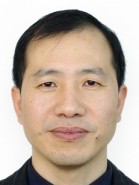
| Prof. Yi PanShenzhen University Advanced Technology, ChinaDr. Yi Pan is Fellow of American Institute for Medical and Biological Engineering, Foreign Member of Russian Academy of Engineering, Foreign member of Ukrainian Academy of Engineering Science, Member of European Academy of Sciences and Arts, Fellow of the Royal Society for Public Health, Fellow of the Institute of Engineering and Technology, and Fellow of the Japan Society for the Promotion of Science. Dr. Yi Pan is currently a Chair Professor and the Dean of College of Computer Science and Control Engineering at Shenzhen University of Advanced Technology, China and a Regents’ Professor Emeritus at Georgia State University, USA. He served as Chair of Computer Science Department at Georgia State University from 2005 to 2020. He has also served as an Interim Associate Dean and Chair of Biology Department during 2013-2017. Dr. Pan joined Georgia State University in 2000, was promoted to full professor in 2004, named a Distinguished University Professor in 2013 and designated a Regents' Professor (the highest recognition given to a faculty member by the University System of Georgia) in 2015. Dr. Pan received his B.Eng. and M.Eng. degrees in computer engineering from Tsinghua University, China, in 1982 and 1984, respectively, and his Ph.D. degree in computer science from the University of Pittsburgh, USA, in 1991. Title: Biological Multiple Sequence Alignment: Scoring Functions, Algorithms, and Evaluations Abstract: Aligning multiple biological sequences is a fundamental task in bioinformatics and sequence analysis. These alignments may contain invaluable information that scientists need to predict the sequences' structures, determine the evolutionary relationships between them, or discover drug-like compounds that can bind to the sequences. MSA also has many applications in Next-Generation Sequencing (NGS) data analysis such aligning multiple short reads. Unfortunately, multiple sequence alignment (MSA) is NP-Complete. In addition, the lack of a reliable scoring method makes it very hard to align the sequences reliably and to evaluate the alignment outcomes. In this talk, I will describe a new scoring method for use in biological multiple sequence alignment. Our scoring method encapsulates stereo-chemical properties of sequence residues and their substitution probabilities into a tree-structure scoring scheme. In addition to the new scoring scheme, we have designed an overlapping sequence clustering algorithm to use in our three new multiple sequence alignment algorithms. One of our alignment algorithms uses a dynamic weighted guidance tree to perform multiple sequence alignment in progressive fashion. The use of dynamic weighted tree allows errors in the early alignment stages to be corrected in the subsequence stages. Other two algorithms utilize sequence knowledge and sequence consistency to produce biological meaningful sequence alignments. The sequence knowledge-based algorithm utilizes the existing biological sequence knowledge databases such as Swiss-Prot to guide sequence alignment. When sequence knowledge databases are not available, the sequence consistency-based algorithm can utilize the consistency information from the input sequence to achieve a similar effect. Experimental results and theoretical analysis indicate that our new scoring function and alignment algorithms truly improve the current best multiple sequence alignment algorithms. |
Prof. Fangxiang WuUniversity of Saskatchewan SK, Canada, IEEE Fellow, IET FellowDr. FangXiang Wu is currently a full professor in the Departments of Computer Science, and the College of Engineering at the University of Saskatchewan. His research interests include Artificial Intelligence, Machine Learning, Computational Biology, Health Informatics, Medical Image Analytics, and Complex Network Analytics. His Google scholar citations are over 16300 and h-index is 67. He is among top 2% world’s scientists ranked by Stanford University since 2017. Dr Wu is serving as the editorial board member of several international journals (including IEEE TCBB, Neurocomputing, etc.) and as the guest editor of numerous international journals, and as the program committee chair or member of many international conferences. He is an IEEE Fellow and an IET Fellow. Title: Artificial Intelligence for ASD Diagnosis Abstract: Autism Spectrum Disorder (ASD) is a common psychiatric disorder disease that typically causes impaired communication and compromised social interactions. Functional magnetic resonance imaging (fMRI) data is one of the common neuroimaging modalities for understanding human brain functionalities as well as the diagnosis and treatment of brain disorders. Artificial intelligence methods with functional magnetic resonance imaging (fMRI) are now providing the great opportunities for ASD diagnosis. In this talk, after brief introductions to ASD and machine learning, I present three machine learning models of our work in ASD image analysis, which include auto-encoder, semi-supervised autoencoder, and graph attention neural network based methods for ASD diagnosis.
|
|
| Prof. Jinghua YangThe First Affiliated Hospital of Zhengzhou University, ChinaYang Jinghua is a distinguished professor and director of the Clinical Systems Biology Center at the First Affiliated Hospital of Zhengzhou University, as well as the director and distinguished professor at the Cancer Research Center of Shandong University. He previously served as the director of the Tumor Surgery Research Laboratory at Boston University VA Medical Center, the director of the Tumor Surgery Research Laboratory at Yale University, and a postdoctoral researcher at Harvard University. He has studied under renowned molecular biologists, including Tom Maniatis and Nobel Prize laureate Richard Axel. He is one of the earliest researchers to discover double-stranded RNA editing enzymes and RNA editing. He has made substantial pioneering contributions in RNA catalysis, double-stranded RNA signal transduction, RNA editing and its biological functions, broad-spectrum antiviral theories, non-coding amino acids in proteomics, and non-coding amino acids in human major diseases. He has published a series of significant papers as the first author or corresponding author in top journals such as Nature and Science. He has received numerous honors, including the National Outstanding Youth Science Fund, the First-Class National Military Science and Technology Progress Award, the National Institutes of Health (NIH) K01 Career Development Award, the NIH Independent PI Research Grant, the Canadian Institutes of Health Research Young Investigator Award, the Taishan Scholar Overseas Distinguished Expert Award, the Yellow River Delta Overseas Distinguished Expert Award, the Goodwill Ambassador of Shandong Province, and the 2016 Science China Person of the Year (Basic Medicine) award. Title: Ubiquitinomics and Major Human Diseases Abstract: Ubiquitin-like protein modification proteomics is a field within proteomics that employs modern ultra-high-resolution mass spectrometry and big data mining to measure non-genetically encoded amino acids in proteins. This approach aims to discover amino acid diversity associated with major human diseases, particularly focusing on both known and unknown protein modifications, amino acid substitutions, alterations in chemical structures, and functional changes. Ultimately, it seeks to elucidate the roles and regulatory mechanisms underlying protein biological functions. Proteomic modification analysis can provide, in a single assay, the protein expression level information traditionally offered by conventional proteomics, while also delivering functional regulation information beyond expression levels, such as phosphorylation, ubiquitination, N-/O-glycosylation, acetylation, lactylation, crotonylation, and other enriched modification proteomic services. The one-stop solution for comprehensive protein modification analysis holds a leading position in the field of mass spectrometry.
|
Prof. Ming ChenZhejiang University, ChinaProf. Ming Chen, director of the Bioinformatics Department at the College of Life Sciences, is a leading figure in the field of bioinformatics at Zhejiang University, China. In 2004, he obtained his Ph.D. in bioinformatics from Bielefeld University, Germany. He was seconded to the Fundamental Research Department of the Ministry of Science and Technology, served as president assistant, and was specially appointed dean at Inner Mongolia Minzu University. Prof. Chen's research encompasses bioinformatics, systems biology, non-coding RNA transcriptomics, and precision medicine. He has published over 200 academic papers in peer-reviewed journals such as Cell, Nature, Nucleic Acids Research, and Bioinformatics, with a Google Scholar H-index exceeding 54. He has been included in the list of the top 2% of scientists globally. Title: Big Data-Driven Biological Age Prediction and Aging Assessment Abstract: Aging research has emerged as one of the most popular global research fields, empowered by big data and artificial intelligence. This talk centers on biological age prediction and the assessment of human aging and mortality risk. We propose a composite machine learning-based biological age (ML-BA) model, which is constructed based on biomarkers obtained from medical examination data. This model integrates multiple machine learning algorithms to yield a more accurate prediction of biological age. The composite ML-BA model shows a strong association with health risk indicators and various diseases, providing enhanced aging measurement capabilities and supporting the potential application of machine learning in aging research. Additionally, leveraging half a billion healthcare records, we have developed an AI model to assess human aging and mortality risk. The interpretable parameters not only serve as excellent reference indicators for mortality risk assessment but also offer guidelines for maintaining a healthy aging process. Combined with our developed HALD database, we can attempt to correlate lifestyles with molecular mechanisms, thereby providing a scientific basis for future precise interventions. Our approach employs state-of-the-art big data analysis techniques in bioinformatics for future aging research studies. |
|



